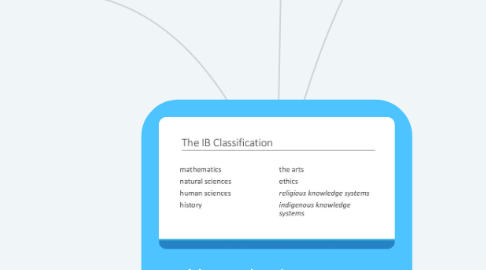
1. Scope & Application (Kat)
1.1. main goal of NC
1.1.1. describing, predicting, understanding natural phenomena
1.1.1.1. observation, prediction, experiment, hypothesis, falsification, conclusions ( empirical evidence)
1.1.1.1.1. laws, theories
1.2. two main branches
1.2.1. life science
1.2.1.1. biology
1.2.1.1.1. phenomena related to living organisms
1.2.2. physical science
1.2.2.1. physics
1.2.2.1.1. study of universe, forces, interactions
1.2.2.2. chemistry
1.2.2.2.1. study of atoms- molecules
1.2.2.3. astronomy
1.2.2.3.1. study of objects outside the earth's atmosphere
1.2.2.4. earth science
1.2.2.4.1. studying events related to earth
1.3. ethics
1.3.1. the effect of application of Natural sciences
1.3.1.1. how experimental processes affect others
1.3.1.2. what are the consequences of the results/ conclusions based on experiments/ observations
1.3.1.3. the purpose of the investigation
1.3.2. religion
1.3.2.1. how religion and its ideologies are affected by scientific principles
1.4. reductionism
1.4.1. reduces theories to basic terms e.g falling in love
1.4.1.1. psychological make- up
1.4.1.1.1. biology
2. Historical Development (Pawan)
2.1. Thomas Kuhn
2.1.1. Cyclical cycles of science
2.1.1.1. Ordinary phase
2.1.1.1.1. Scientific developments, but under a paradigm
2.1.1.2. Extraordinary phase
2.1.1.2.1. The paradigm collapses and the current scientific model is proved wrong
2.1.2. Scientific "truth" is simply the consensus of scientists
2.1.2.1. Therefore we must consider the subjectivity of the individuals who create that truth
2.2. History of the atomic model
2.2.1. The first theory came from ancient Greece and India
2.2.1.1. In the 5th Century BC Democritus theorised that matter was made up of "indestructible, indivisible units called atoms".
2.2.1.1.1. 1789: Antoine Lavoisier came up with the law of conservation of mass
3. Language and concepts (Vanshika)
3.1. general framework questions
3.1.1. what metaphors are appropriate
3.1.2. what are the roles of the key concepts and terms that provide the building blocks?
3.1.3. what role does language play
3.1.3.1. use of intuition
3.1.4. what is the role of convention in this idea?
3.1.5. common to all sciences
3.1.5.1. method
3.1.5.2. aim
3.1.5.3. result
3.1.5.4. hypothesis
3.1.5.5. units
3.1.6. key terms
3.1.6.1. case studies
3.1.6.2. correlation
3.2. specific ideas
3.2.1. many laws in natural sciences are stated in mathematics
3.2.2. language is precise
3.2.2.1. to eliminate ambiguity (because it might affect the reasoning
4. Personal knowledge
4.1. contribution of an individual:
4.1.1. observation- experiments, understanding of natural phenomena( knowledge)
4.1.1.1. improvement of our life conditions
4.1.1.2. knowledge and understanding of our environment- universe
4.1.1.2.1. validity of sources based on scientific approach ( reason)
4.1.2. personal experience: Kat
4.1.2.1. teachers in schools through experiments e.g Eratosthenes experiment
4.1.2.2. discussions with classmates
4.1.2.2.1. hypothesis, assumptions
4.1.2.3. responsibilities
4.1.2.3.1. not share or present as valid knowledge that is not evidently proved
4.1.2.4. personal assumptions regarding to the knowledge gained through this area of knowledge ( NC)
4.1.2.4.1. Most of the times we trust this knowledge as it is based on empirical evidence
4.1.2.4.2. observations, conclusions are subjective
5. Methodology- Shivangi
5.1. Scientific method
5.1.1. 1. Inductive Method
5.1.1.1. RESEARCH
5.1.1.2. EMPIRICAL EVIDENCE
5.1.1.3. PATTERNS
5.1.1.4. INTERPRETATION OF DATA
5.1.2. 2. Hypothetico Deductive methods
5.1.2.1. Involves a HYPOTHESIS
5.1.2.2. Measurable, controllable and repeatable experiments.
5.1.2.3. (outcome)
5.1.2.3.1. Refutation/falsification- discarding of the hypothesis.
5.1.2.3.2. Confirmation- peer review and repeated observations leading to confirmation of the hypothesis. (true until suggested otherwise)
5.2. Clinical Trial
5.2.1. Hypothesis/ product- medicine
5.2.2. Testing of predictions- Does it work?
5.2.3. experiments- measurable, controllable, repeatable.
5.2.3.1. double blinded- placebo VS real product
5.2.3.2. randomised- doctor isn't aware of which patients have taken the medicine and which have taken placebo.
5.2.3.2.1. prevents experimenter's bias
5.2.4. (outcome)
5.2.4.1. confirmation- suggested to be true until refuted
5.2.4.1.1. product is reviewed and released
5.2.4.2. refutation- hypothesis discarded
5.3. Field study
5.3.1. conducted in natural surroundings
5.3.1.1. Limitation- external factors can affect the results.
5.3.1.2. Advantage- the nature of the result is raw
5.3.2. establishes correlation but does not always show causation due to the involvement of external factors.
5.3.2.1. A Theory is developed
